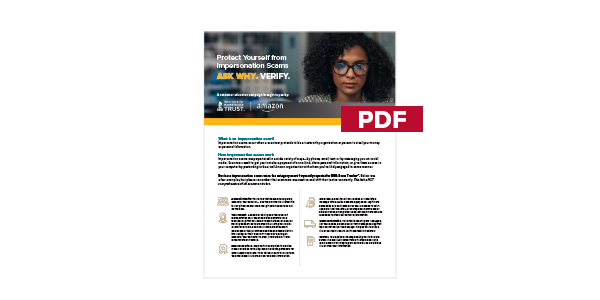You’re told that hackers have gotten access to your account — and the only way to protect it is to buy gift cards and share the gift card number and PIN on the back.
Better Business Bureau® and Amazon, a BBB Accredited Business, have partnered on a consumer education campaign to help people avoid impersonation scams.
What is an impersonation scam?
Impersonation scams occur when a scammer pretends to be a trustworthy organization or person to steal your money or personal information.
How impersonation scams work
Impersonation scams are perpetrated in a wide variety of ways—by phone, email, text, or by messaging you on social media. Scammers seek to get you to make a payment of some kind, share personal information, or give them access to your computer by pretending to be a well-known organization with whom you’ve likely engaged in some manner.
Scammers claiming to represent a legitimate organization was the tactic most reported by users of BBB® Scam Tracker℠. These scammers often pose as trusted businesses to gain your trust.
Below are a few examples, but please remember that scammers are creative and shift their tactics constantly. This list is NOT comprehensive of all scammer tactics.
If you're targeted by a scammer
Know how to spot an impersonation scam. Scammers will try to steal your personal information or money by:
- Reaching out unsolicited to ask for personal information or payment for something.
- Pressuring you to act immediately.
- Asking you to wire money or send gift cards (untraceable forms of payment).
- Threatening you in some way (for example, penalties or jail time).
- Offering something that is “too good to be true.”
How to protect yourself from impersonation scams
Stay calm. If you are contacted by a possible impersonation scammer, resist the urge to act immediately, no matter how dramatic the story is or how threatening or intimidating the caller sounds.
Don’t reply directly. Don’t respond to the call, text, or email. Instead, call the company or person directly to verify the message or the phone call you received.
Go to the source or get help. When in doubt, call a friend, loved one or your local BBB to ask for a second opinion.
Never feel pressured to give personal information (SSN, account numbers/passwords, license number, etc.) over the phone, especially if the call was unexpected. Scammers may impersonate a company’s customer service, even spoofing a number. If you’re unsure, end the call/chat and reach out directly to the company’s customer service phone number or website.
Never pay over the phone, especially if the call was unsolicited. To make a payment, you should be able to go directly to the organization’s website.
Never allow remote access to your computer if somebody offers tech support. Shut down your computer immediately and seek support directly from your service provider.
Search BBB Scam Tracker. If you’re suspicious about the situation, search BBB Scam Tracker to see if anyone else has reported a similar situation. The NEW BBB Scam Tracker enables you to search by email, URL, phone number, and more.
Check the email address or URL more closely. Scammers use similar website addresses or emails to appear legitimate, but if you look closely, you may find one letter or number that is off. How to spot a scam email.
Learn more about impersonation scams
More tips from BBB:
- BBB Business Tip: What to do if scammers impersonate your business
- BBB Scam Alert: That’s not your boss texting
- BBB Tip: How to spot a fake social media account
- BBB Tip: How to identify a fake website
- BBB Tip: Spot the red flags of fake text messages
- BBB Tip: How to recognize a phony email
- BBB Warning: Lottery scam involves impersonating Better Business Bureau
- BBB Tip: How to avoid impostor scams
- BBB.org/SpotAScam







